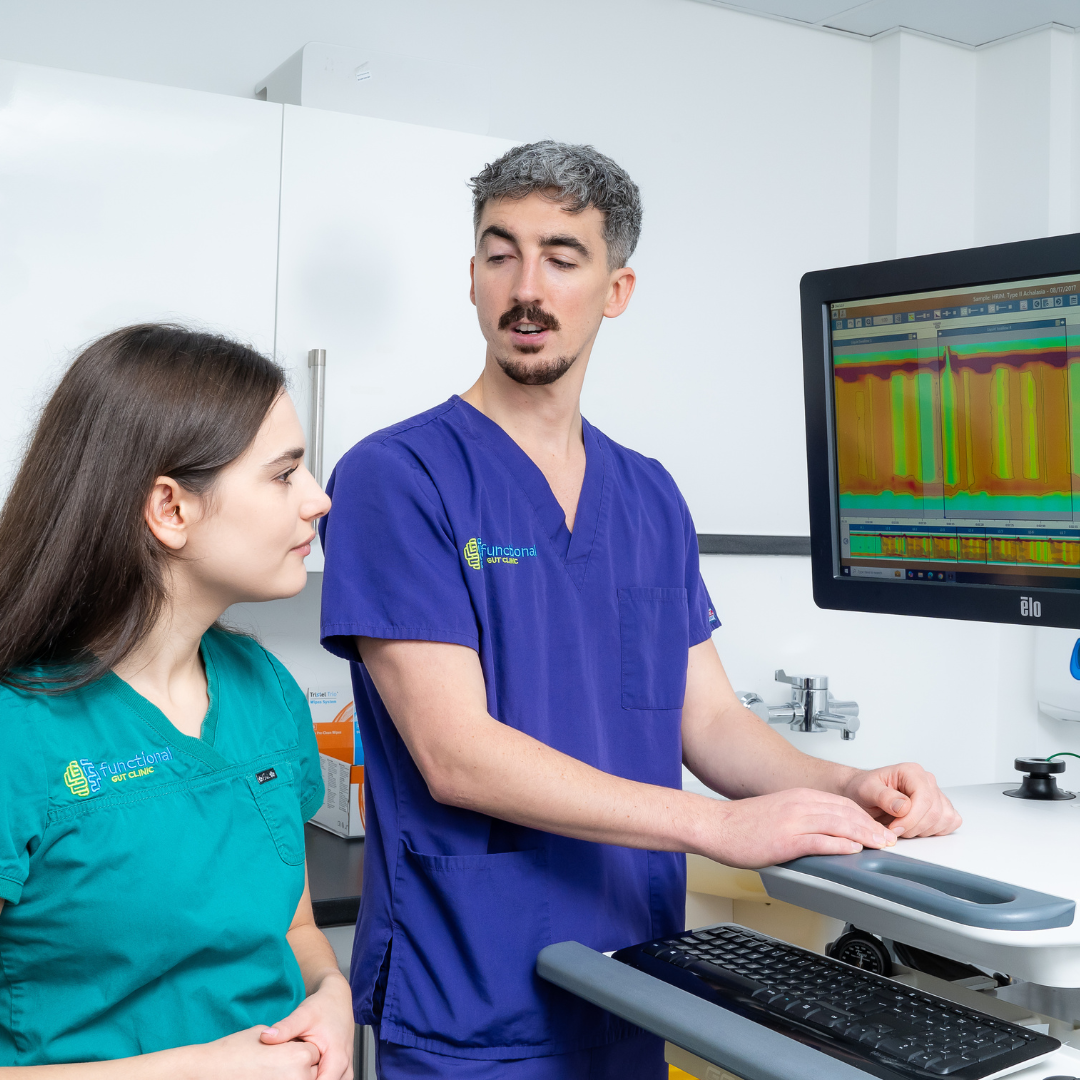Bloating
Struggling with bloating? Here’s what you need to know to find relief.
ALL TEST ARE ACCREDITED & REGULATED BY



What is bloating?
When you’re bloated, your stomach or abdomen can feel full and uncomfortable, or even painful.
This bloating happens when your gastrointestinal tract contains too much gas or air. Bloating can be mild, or more severe, and may present as:
– A visibly distended or swollen abdomen
– Feeling very full and uncomfortable
– Feeling of tightness in the abdomen
– Excess gas – belching and/or flatulence
– Rumbling or gurgling
There are several causes of bloating, so it’s important to diagnose the cause of your bloating and find out why it’s happening to you.

Why does bloating happen?
Prolonged periods of bloating could indicate an underlying health problem, if so you should see your GP.
Possible causes can include:
Irritable bowel syndrome (IBS diagnosis)
Ulcerative colitis, a form of inflammatory bowel disease (IBD), where the inner lining of the large bowel is inflamed and develops ulcers
Crohn’s disease, the other form of IBD, where some parts of your colon are inflamed
Too much bacteria in your small intestine (called small intestinal bacterial overgrowth, or SIBO)
Gastroesophageal reflux disease
Food intolerances, especially lactose or fructose intolerance
Producing too much gas (dysbiosis and fermentation)
Weight gain
Stress or anxiety
Delays in your food and drink moving on from your stomach (called gastroparesis)
Eating too quickly, so that you swallow too much air (called aerophagia)


Diagnosing bloating
Feeling bloated is no fun, but once you know what’s going on you can start to manage your symptoms and the underlying causes.
Testing options:
At the Functional Gut Clinic, we can run the following tests to diagnose the causes of bloating:
Gastric emptying test– which measures how quickly food leaves your stomach
Carbohydrate malabsorption breath test– which finds out if you have certain food intolerances (lactose or fructose)
Small intestinal bacterial overgrowth (SIBO) breath test– which finds out if you have an overgrowth of bacteria in your small intestine (called SIBO)
Oesophageal manometry– which measures the function of your oesophagus (food pipe)
24-hour pH impedance monitoring– which looks at whether you have any reflux
Colonic transit study-a non-invasive test which looks at how long it takes for faeces to pass through your bowl
Learn more about bloating

Thiamine (Vitamin B1) improves fatigue in patients with IBD.
Fatigue is an extremely common symptom in patients with inflammatory bowel disease (IBD). Even if the disease is in remission, up to 50% of IBD patients still experience fatigue.
The cause of fatigue in these patients can be related to different factors such as iron, vitamin B12 or folate deficiency, or anaemia and hypothyroidism. However, most patients have not identified an underlying cause, and there are a few pharmacological drugs that have a documented effect on fatigue in IBD patients.
A recently published double blinded, placebo-controlled crossover trial study found a significant decrease in fatigue in patients with IBD in remission who were receiving high-dose oral thiamine (vitamin B1). The 40 patients involved in this study did not have any underlying cause of fatigue and were given 600-1800mg thiamine hydrochloride (dose dependent on gender and body weight) for 4 weeks. Improvement in fatigue (decrease of ≥3 points in IBD-Fatigue Questionnaire) was seen in 55-75% of participants whilst taking the thiamine supplement.
The mechanism behind thiamine helping to reduce fatigue in IBD is unknown, but it is hypothesised that IBD patients have impaired thiamine transport from blood to mitochondria. Hence, taking thiamine supplements increases cellular carbohydrate metabolism. Thiamine is a water-soluble vitamin that is found naturally in meat, legumes, and dairy products. Bager and colleagues concluded that thiamine was well tolerated and only mild side effects were reported. Also, thiamine accumulation is not a risk in patients with normal kidney function.
A smaller unblinded pilot study involving 12 participants was published in 2013 and found the same effect of thiamine on IBD patients in remission. This study reported an improvement in bowel symptoms after 20 days of high-dose thiamine. Bowel symptoms like abdominal pain and bloating are also commonly reported by patients with IBD in remission. This is often caused by small intestinal bacterial overgrowth (SIBO) or lactose intolerance. Both SIBO and lactose intolerance can easily be diagnosed by a simple hydrogen and methane breath test.
Think your gut health is a bit off? Or just experiencing some unpleasant symptoms you would like to get rid of? Contact us today and our multidisciplinary team will be happy to help.
Please get in touch if you need help with your gut issues.
References
Borren NZ, van der Woude CJ, Ananthakrishnan AN. Fatigue in IBD: epidemiology, pathophysiology and management. Nat Rev Gastroenterol Hepatol. 2019;16(4):247-59.
Bager P, Hvas CL, Rud CL, Dahlerup JF. Randomised clinical trial: high-dose oral thiamine versus placebo for chronic fatigue in patients with quiescent inflammatory bowel disease. Alimentary Pharmacology & Therapeutics. 2021;53(1):79-86.
Costantini A, Pala MI. Thiamine and fatigue in inflammatory bowel diseases: an open-label pilot study. J Altern Complement Med. 2013;19(8):704-8.
Shah A, Morrison M, Burger D, Martin N, Rich J, Jones M, et al. Systematic review with meta-analysis: the prevalence of small intestinal bacterial overgrowth in inflammatory bowel disease. Aliment Pharmacol Ther. 2019;49(6):624-35.
Hear from people we’ve helped, just like you.
"Very professional while welcoming and friendly"
"The manner and demeanour of all staff from reception to people carrying out the test was very professional but welcoming and friendly. Atmosphere is very relaxed and all instructions clear and concise."
London Patient

"Highly recommend this"
"Thanks to Dr Hobson and everyone at the Functional Gut Clinic. The whole team is very kind and generous and they are doing things that are cutting edge and they actually get results."
Manchester Patient

"Highly recommend this"
"After stopping my lansoprazole, every time I had a warm drink, I could feel it burn all the way down to my stomach. Thank you to Sam for making me feel at ease." - Manchester Patient

"My experience could not be better"
"Pleasant and knowledgeable staff that made the experience more enjoyable than it should be!" - London Patient

"Very friendly and knowledgeable"
"An excellent service from beginning to end. I would recommend to anyone who was considering having testing done. Very friendly and knowledgeable!" - Manchester Patient

"Very kind and helpful"
"It was also great to have time to talk to the clinicians – very important when you have problems. Reception staff also very kind and helpful." - Manchester Patient

Are you experiencing any other symptoms
Symptoms are often closely connected. Find out more below.
Reflux

Burning mid-chest, worse when bending or lying down
Constipation

Difficulty going to the toilet, unusual stools, often with stomach ache or intestinal cramps, bloating, nausea or appetite loss
Heartburn

A burning pain in your chest, just behind your breastbone.
The pain is often worse after eating...
Regurgitation

Bringing food or drink back up, difficulty swallowing, feeling that food or drink is stuck in your throat, horrible taste in your mouth
Swallowing Issues

Dysphagia - difficulty swallowing, feeling that food or drink is stuck in your throat, horrible taste in your mouth
Diarrhoea

Loose or explosive stools, can’t get to a toilet in time
Abdominal Pain

Cramps; sharp or dull pain, Bloating, Excessive belching, Nausea or vomiting
Faecal Incontinence

Stools leak unexpectedly, Can’t get to a toilet in time
IBS

Abdominal pain or cramping, bloating, changes in bowel habits and urgency, gas

